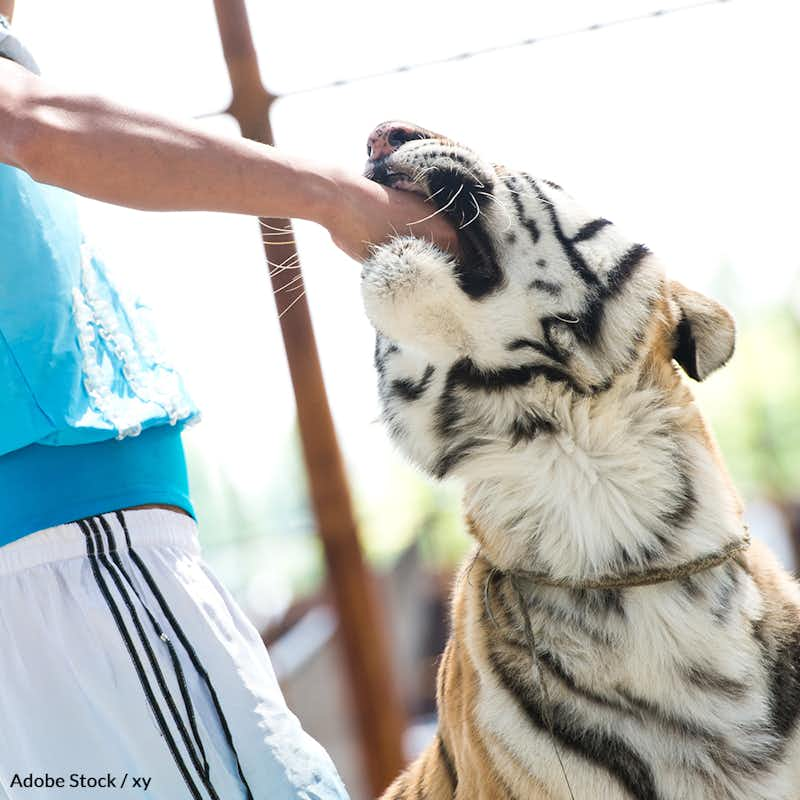Stop Groupon From Profiting Off Exploitation
14,811 signatures toward our 30,000 Goal
Sponsor: The Animal Rescue Site
Groupon partners with businesses that exploit wild animals for tourist entertainment and profit. Take a stand for wild animals!

Groupon makes its money by bringing business to companies who in turn offer discounted deals to customers1. Services companies like restaurants, gyms, and hotels can benefit from this relationship, but Groupon also partners with businesses that exploit wild animals for tourist entertainment and profit2.
Among other companies, Groupon has sold deals for:
- The Miami Seaquarium, where 56-year-old Tokitae, an orca, has spent the last half century languishing alone in a tiny concrete tank3.
- Suncoast Primate Sanctuary, a roadside zoo in Florida that keeps primates in small, barren cages.
- Marineland in Niagara Falls, a facility that now faces numerous animal cruelty charges, and where a 45-year-old orca called Kiska has been suffering in isolation, seen more than once ramming her head into the wall of her small concrete tank4.
Groupon has worked with some of the most infamous wildlife exploiters in the United States, including the Garold Wayne Interactive Zoological Park (G.W. Exotic), the facility owned by "Tiger King" Joe Maldonado, as well as multiple circuses that used elephants in dangerous and harmful performances such as Ringling Bros. and Barnum & Bailey Circus.
Venues that offer interactions with captive wild animals may call them "experiences," "encounters," or "meet-and-greets." These facilities may hold a range of wild animals in interactions, but nonhuman primates, elephants, dolphins, alligators, and big cats feature prominently5.
Many times, to enable these types of interactions, animals are restrained, coerced through abusive training, or enclosed in such a small space that they do not have a choice about whether to participate6.
The fact is, forcing wild animals to engage with humans, stripping them of their freedom, can be highly stressful and causes suffering7. For some species, such as big cats and alligators, venues must maintain a reliable stream of babies that they can use in interactions, discarding, selling, or even killing those that are no longer profitable.
These interactions can be extremely dangerous for both animals and humans yet they are often promoted to young children8.
Sign the petition and help us ask Groupon to stop profiting from wild animal suffering and adopt a public animal welfare policy that protects animals!
- Claire Boyte-White, Investopedia (24 September 2019), "How Groupon Makes Money."
- Sentient Media, Jennifer Mishler (7 June 2022), "Groupon Boosts Attendance at 'Notorious' Zoos and Aquariums."
- Hannah Goldstein, World Animal Protection (29 April 2022), "Devastating Deals: How Groupon Profits from Wild Animal Abuse."
- Alison Langley, Niagara Falls Review (29 June 2022), "Animal rights activists call on Groupon to drop Marineland as theme park makes another court appearance."
- World Society for the Protection of Animals (2022), "Devastating Deals: How Groupon Rakes in Profits from Wild Animal Exploitation."
- Rachel Fobar, National Geographic (15 August 2019), "Hundreds of zoos and aquariums accused of mistreating animals."
- World Society for the Protection of Animals (2017), "A close up on cruelty: The harmful impact of wildlife selfies in the Amazon."
- Born Free USA (2022), "Forced Interactions between Animals and Humans."
The Petition:
To the CEO of Groupon,
Your platform has provided valuable opportunities for many small business of the United States, driving new customers to shops and attractions they might have otherwise never considered.
As Groupon intentionally partners with companies that provide family-friendly experiences, it should hold that businesses who profit off exploitation and suffering miss that mark. Sadly, this is not the case.
Some venues call them "experiences," "encounters," or "meet-and-greets," featuring nonhuman primates, elephants, dolphins, alligators, and big cats.
Many times, to enable these types of interactions, animals are restrained, coerced through abusive training, or enclosed in such a small space that they do not have a choice about whether to participate.
The fact is, forcing wild animals to engage with humans, stripping them of their freedom, can be highly stressful and causes suffering. For some species, such as big cats and alligators, venues must maintain a reliable stream of babies that they can use in interactions, discarding, selling, or even killing those that are no longer profitable.
These interactions can be extremely dangerous for both animals and humans yet they are often promoted to young children.
I implore you to end any and all partnerships with facilities that profit off interactive animal exhibits, now and in the future, and instead adopt a public animal welfare policy that protects animals!
Sincerely,